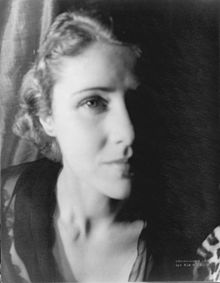Clare Boothe Luce
American writer, politician, ambassador, journalist and anti-Communist activist (1903-1987)
Clare Boothe Luce (April 10, 1903 – October 9, 1987) was an American playwright, journalist, editor, ambassador and political figure.

Quotes
edit- I have resolved to grow old, naturally and gracefully, content in the knowledge that the greatest intellects are the homeliest ones, and that the height of sophistication is simplicity.
- Stuffed Shirts, ch. 17 (1931) [2]
- You see few people here in America who really care very much about living a Christian life in a democratic world.
- Europe in the Spring, ch. 12 (1940)
- Communism is the opiate of the intellectuals [with] no cure except as a guillotine might be called a cure for dandruff.
- Newsweek (Jan. 24, 1955)
- No good deed goes unpunished.
- Roman Candle (Leticia Baldridge), p. 129 (1956)[1]
- There are no hopeless situations; there are only men who have grown hopeless about them.
- Europe in the Spring (1940), p. 271[2]
- A man has only one escape from his old self: to see a different self — in the mirror of some woman's eyes.
- Mrs. Morehead, act I
- You know, that's the only good thing about divorce; you get to sleep with your mother.
- Little Mary, act III
- Always remember, Peggy, it's matrimonial suicide to be jealous when you have a really good reason.
- Edith, act III
References
edit- ↑ This famous quip was first quoted in print by Luce's social secretary Letitia Baldrige in Roman Candle (Houghton Mifflin, Boston, 1956), 129: "When I would entreat her to engage in resolving a specific case, she replied, 'No good deed goes unpunished, Tish, remember that.'" Oscar Wilde, Billy Wilder, and Andrew Mellon have also been cited as sources, but without written evidence.
- ↑ See [1]. If her story can be taken at face value, she was actually relating the remark of a French diplomat that sat next to her at airport in London (see pages 269-270). The diplomat explained that he had been a captain in the trenches at the Battle of Verdun during WWI and ended up surviving instead of dying or surrendering: "'Since that day,' the little grey-haired diplomat said, 'I have had my motto: Il n'y a pas de situations désespérées, il y a seulement des hommes désespérés (There are no hopeless situations; there are only men who have grown hopeless about them).'"